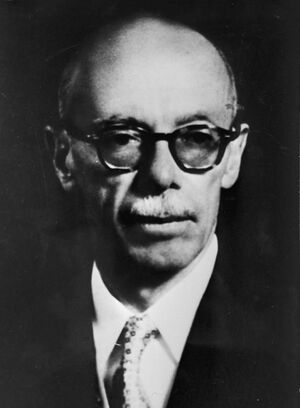José María Velasco Ibarra
(politician) | ||||||||||||
|---|---|---|---|---|---|---|---|---|---|---|---|---|
 | ||||||||||||
| Born | José María Velasco Ibarra 1893-03-19 Quito, Ecuador | |||||||||||
| Died | 1979-03-30 (Age 86) Quito, Ecuador | |||||||||||
| Alma mater | Central University of Ecuador | |||||||||||
| Religion | Roman Catholic | |||||||||||
| Spouse | Corina Parral de Velasco Ibarra | |||||||||||
| Party | Conservative | |||||||||||
Populist politician elected five times, removed from power by the army (with the help of the CIA) four times.
| ||||||||||||
José María Velasco Ibarra [1] was an Ecuadorian politician. He became president of Ecuador five times, in 1934–1935, 1944–1947, 1952–1956, 1960–1961, and 1968–1972, and only in 1952–1956 did he complete a full term. In his four other terms he was removed by military force, and several times he was installed as president through a military coup.
The events around the end of his fifth and final term are treated in the book "Inside the Company: A CIA Diary" by former CIA agent Philip Agee, in which he recounts how he led the operation to remove Velasco from power.
Velasquismo
Velasco Ibarra ruled in the economic crisis (1934-1935), in the post-territorial crisis (1944-1947), at the beginning of the banana boom (1952-1956), at the beginning of the Castro revolution (1960-1961), and in the run-up to the oil "boom" (1968-1972).
His thirteen years in power and forty years as a politician signified a continuity of populist influence that contrasted with the instability of the country.
Velasco Ibarra inaugurated a new style of politics that included voters and non-voters. The historian Alfredo Pareja Diezcanseco says that “it is very difficult to define Velasco Ibarra ideologically. In general, he was a Catholic liberal, with a desire for reforms and a passion for construction, often improvised».[2]
The sociologist Esteban del Campo underlines the charisma of the populist leader: «It would be absurd to deny that since his appearance José María Velasco Ibarra has stood out in Ecuadorian political life due to the qualities of a true leader, to peculiarities of his personality that have not been paralleled in our country. contemporary history (...) Velasco Ibarra's charismatic leadership has tended towards a «Bonapartism» (personalist rule independent of the parties) that is all the more accentuated if we take into account the ambiguous ideological position that has characterized him ».[2]
References
- ↑ Profile of José María Velasco Ibarra
- ↑ a b Simón Espinoza (2000) Presidentes de Ecuador. Editorial Vistazo